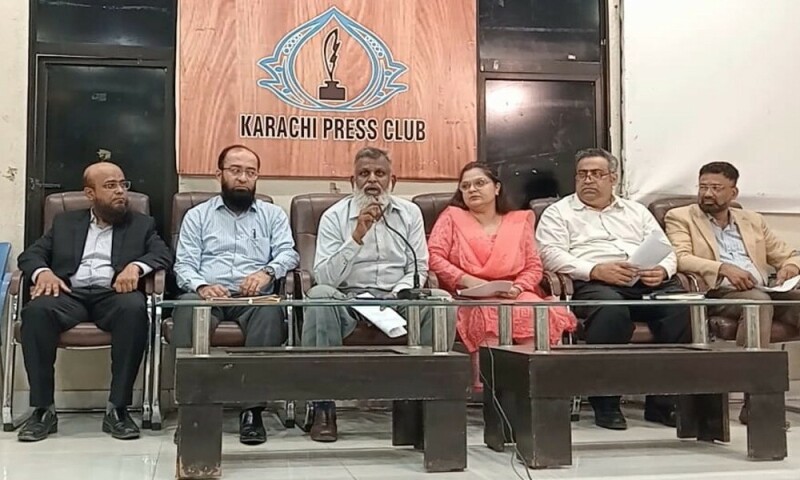There was a rather unique press conference at the Karachi Press Club (KPC) on Tuesday. It was not a textile association or a business chamber holding a briefing to demand lower taxes or cheaper electricity. It was the people who help run Pakistan’s industrial and services sectors.
In what was in all likelihood their first media appearance, members representing Pakistan’s salaried group held a short and concise press briefing listing their complaints and appealed to Finance Minister Muhammad Aurangzeb to pay heed.
“What was the point of a well-informed person from the formal sector taking over the reins if tax collection was to be increased like this?” asked Adeel Ahmed Khan, member of the ‘Salaried Class Alliance Pakistan’, in a press conference inside KPC premises.
Ironically, while they were holding the briefing, Aurangzeb was introducing the minor modifications to the budget in the National Assembly in Islamabad. The finance chief did not mention the salaried group.
Budget 2024-25: income tax calculator for FY25
Nonetheless, six members representing the so-called alliance were present at the briefing, taking turns as they listed grievances with Pakistan’s taxation system.
Adeel’s reference was towards Aurangzeb, who was the president and CEO of Habib Bank Limited before he left the positions to take over as finance chief amid hope that he could help steer the economy out of trouble.
Instead, what Pakistan’s salaried group saw was the imposition of higher taxes in Aurangzeb’s first budget announcement earlier this month, sending shivers down people employed in the formal sector.
“If taxes were to be increased like – Rs100 billion from here and Rs50 billion from there – then anyone could have done this.”
The rather-hastily arranged press briefing came after the government increased tax liability for all persons earning more than Rs50,000 a month in Budget 2024-25 announced on June 12.
Senate panel rejects increased tax on salaried class
Tax slabs in Finance Bill 2024 revealed that the highest impact would be on anyone earning equal to or more than Rs6 million a year (Rs500,000 a month). The tax liability for these earners increased by Rs22,500.
Interestingly, the tax increase for salaried persons earning as high as Rs12 million a year (Rs1 million a month) was also Rs22,500.
While the government did not touch the income tax exemption threshold – which still stood at Rs50,000 – liability increased across all other levels of salaries. For example, a person earning Rs100,000 a month will now pay Rs2,500 a month, up from the earlier level of Rs1,250.
Govt to see if it can ‘protect’ Pakistan’s salaried class further, says Aurangzeb
The Salaried Class Alliance Pakistan was established last year after the previous budget, which also saw higher taxes on the group.
Islamabad, over the years, has increased taxes on salary and their contribution shows a seven-times increase over 11 years. The increase over the last four years has been especially profound.
“Landlords who earn 20% of GDP from agriculture pay less than 1% in taxes, while wage earners are paying up to 35%,” read a statement issued by the Alliance.
“There is only one class – the salaried class in Pakistan – that pays full income tax and the tax burden was already very high. This middle class has been broken in the recent budget,” said another member Ubaidullah Sharif.
Adil Iqbal, another member, said that instead of widening the tax net, the already depressed salaried group has been further burdened.
“Movement of educated people from Pakistan to foreign countries has increased by 119% in the last one year and, according to media reports, a major reason for this is the brutal increase in taxes. This brain drain of educated youth needs to be reduced immediately,” he said.
Alliance in the press briefing demanded that the minimum tax threshold for salaried employees should be fixed at Rs100,000 per month instead of Rs50,000. The tax rate should be brought down to at least the outgoing fiscal year’s rate
Addressing so-called counter-arguments that the ‘brain drain’ will also help Pakistan in the form of remittances, Adil said if the ‘rulers’ think like this, they are “delusional”.
He added that those who move with their families – the skilled lot – does not send back remittances.
Komal Ali, another member of the group, also said that disgruntled people leaving Pakistan wouldn’t want to send remittances.
It was also stressed that many small businesses are now trying to pay their employees in cash, defeating the official purpose to formalise the economy.
‘Demands’
The alliance in the press briefing demanded that the minimum tax threshold for salaried employees should be fixed at Rs100,000 per month instead of Rs50,000. The tax rate should be brought down to at least the outgoing fiscal year’s rate.
The tax exemptions given to government officials on their perks, vehicles and plots should either be abolished or equivalent exemptions should be given to all private sector employees.
Instead of putting the entire burden on the salaried group, the tax net should be increased.
The Alliance said that they may also explore legal options and knock the doors of the Supreme Court if the government turns a deaf ear to their demands.
Read the full story at the Business Recorder - Latest News website.

